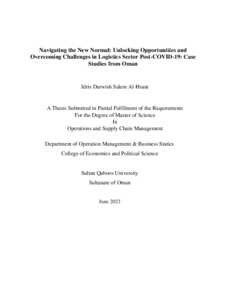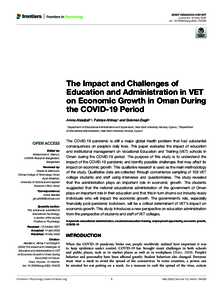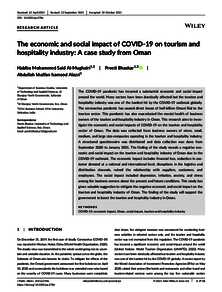وثيقة
Navigating the new normal unlocking opportunities and overcoming challenges in logistics sector post-COVID-19 : case studies from Oman.
المصدر
Master's thesis
عناوين أخرى
الفرص والتحديات في قطاع اللوجستيات في الوضع الطبيعي الجديد (بعد جائحة كوفيد-19 ) : دراسة حالة من عمان
الدولة
Oman
مكان النشر
Muscat
الناشر
Sultan Qaboos University
ميلادي
2023
اللغة
الأنجليزية
نوع الرسالة الجامعية
Master's thesis
الملخص الإنجليزي
The logistics and transportation industries experienced particularly difficult challenges during the
worldwide pandemic, which led to a change in mindset toward the "new normal." As the famous
saying goes, 'Necessity is the mother of invention', this research investigates the opportunities and
challenges encountered by logistics companies in the post-COVID-19 era, specifically focusing
on the case of Oman. The study explores the role of organizational mitigation strategies, dynamic
capabilities, and strategic agility in navigating the complexities of the 'new normal.'
Employing a comprehensive literature review and empirical analysis, this research discovers the
remarkable strategies that have enabled companies to adapt and thrive amidst uncertainty. By
examining domestic and international transportation networks and engaging with industry
stakeholders through semi-structured interviews followed by careful thematic analysis, the study
extracts valuable insights into the sector's response and provides guidance for industry
practitioners and policymakers.
Findings from the analysis shed light on the critical role of organizational mitigation strategies,
where companies have implemented measures such as supply chain diversification, risk
assessment, and agile decision-making to ensure resilience in the face of ongoing disruptions. The
study also highlights the significance of dynamic capabilities as companies demonstrate their
ability to swiftly adapt, embrace digitalization, and leverage emerging technologies to optimize
their operations in the 'new normal.'
Strategic agility emerges as a key factor, enabling companies to adjust their business models,
shape collaborative partnerships, and seize emerging opportunities.
Moreover, this research explores the opportunities and valuable lessons learned from the
pandemic. It discloses transformations within the industry, such as the accelerated adoption of
digitalization, the emergence of new business models, and the growing emphasis on sustainable
practices. These opportunities allow logistics firms to rethink their business models, boost
efficiency, and promote an innovative culture under the "new normal." The practical implications
of this research extend to logistics practitioners, policymakers, and researchers. Industry
professionals can draw upon the insights gained to adapt their strategies, enhance resilience, and
chart a path toward sustained success in the 'new normal.' Policymakers can harness the insights
from this research to make informed decisions, facilitate the industry's adaptation, and enhance
an encouraging environment. Additionally, researchers gain a deeper understanding of the sector's
response to the pandemic, identifying areas for further exploration and potential ways for future
research in the context of the 'new normal.'
Furthermore, this study fills a notable gap in the literature by specifically addressing Oman's
logistics industries in the post-COVID-19 era. By examining the unique context of Oman, the
research provides tailored insights that can be applied to similar industries globally, amplifying
its significance beyond national borders.
Ultimately, this research contributes to a deeper understanding of the logistics sector's response
to the COVID-19 pandemic, enabling stakeholders to navigate the challenges and seize the
opportunities in the 'new normal.' By embracing supply chain diversification, digitalization, and strategic positioning, logistics companies can build resilience, ensuring their long-term success and thriving in the face of ongoing uncertainties.
الملخص العربي
شهد قطاع اللوجستيات تحديات صعبة بشكل خاص خلال الجائحة العالمية، مما أدى إلى تغيير التفكير نحو "الوضع الطبيعي" الجديد. كما يقول المثل الشهير، "الحاجة أم الاختراع"، تستكشف هذه الدراسة الفرص والتحديات التي تواجه شركات اللوجستيات في عصر ما بعد كوفيد،19- مع التركيز بشكل خاص على حالة سلطنة عمان. حيث تستكشف الدراسة دور استراتيجيات التخفيف التنظيمية والقدرات الديناميكية والمرونة الاستراتيجية في التعامل مع تعقيدات "الوضع الطبيعي الجديد". ومن خلال استعراض شامل للمراجع الادبية والتحليل التجريبي، تبحث هذه الدراسة في الاستراتيجيات الملحوظة التي أتاحت للشركات التكيف والازدهار في ظل غموض الوضع، ومن خلال تقييم قطاع النقل واللوجستيات المحلية والدولية والانخراط ّظ مع أصحاب القرار في القطاع وذلك مة متبوعة بتحليل موضوعي دقيق؛ تستخلص هذه من خلال عمل مقابالت شبه من الدراسة رؤى قيّمة حول استجابة القطاع وتوفر إرشادات للمشتغلين في القطاع وصانعي السياسات. كما أن النتائج المستخلصة من التحليل، تسلط الضوء على الدور الحاسم الستراتيجيات التخفيف التنظيمية، حيث اتبعت الشركات تدابير مثل تنويع سلسلة التوريد وتقييم المخاطر واتخاذ القرارات المتجاوبة لضمان المرونة والصمود في مواجهة الاضطرابات المستمرة. كما تسلط الدراسة الضوء على أهمية القدرات الديناميكية، حيث تظهر الشركات قدرتها على التكيف بسرعة واستيعاب التكنولوجيا الرقمية واستغالل التقنيات الناشئة لتحسين عملياتها في "الوضع الطبيعي". كما تبرز ميزة التكيف وسرعة التأقلم الاستراتيجي للقطاع كعامل رئيسي، مما يم ّكن الشركات من ضبط نماذج أعمالها وتشكيل شراكات تعاونية والاستفادة من الفرص الناشئة. عالوة على ذلك، تستكشف هذه الدراسة الفرص والدروس القيمة المستفادة من الجائحة. حيث تكشف عن التحوالت داخل الصناعة، مثل تبنّي مبادرات سريعة للتحول الرقمي، وظهور نماذج أعمال جديدة، والتركيز المتزايد على الممارسات المستدامة. كما تتيح هذه الفرص لشركات الخدمات اللوجستية والنقل إعادة النظر في نماذج أعمالها وزيادة الكفاءة وتعزيز ثقافة الابتكار في "الوضع الطبيعي". كما تمتد الاثار العملية لهذه الدراسة إلى المشتغلين بالقطاع اللوجستي وصناع السياسات والباحثين، كما يمكن للعاملين في القطاع الاستفادة من الارشادات المكتسبة لتكييف استراتيجياتهم وتعزيز المرونة ورسم مسار نحو النجاح المستدام في "الوضع الطبيعي".
قالب العنصر
الرسائل والأطروحات الجامعية



